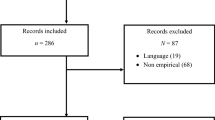Abstract
Purpose
To assess medical students’ attitude toward occupational health (OH) in Brazil and Germany before and after a compulsory OH course.
Methods
A questionnaire regarding the attitude toward OH was completed by medical students at the beginning of the OH teaching term at the Federal University of Paraná in Curitiba, Brazil (n = 79), and at both medical schools in Munich, Germany (n = 266), in 2009/2010. The change in the assessed qualities over the course period was measured repeating the survey at the end of the teaching term (n = 193; 56%).
Results
Overall, attitude toward OH was relatively low in both countries (mean 3.0 ± SD 1.2 on a scale from 1 = very low to 6 = very high) and students did not consider OH as a career option. However, Brazilian medical students rated the importance of OH statistically significantly higher than German medical students. Students in both countries considered their knowledge of OH low (2.2 ± 0.9). Not only self-assessed knowledge of OH (mean difference 1.5; 95% confidence interval 1.3–1.6) but also interest in OH (mean difference 0.2; 95% CI 0.06–0.4) improved statistically significantly over the teaching term.
Conclusions
A negative attitude toward OH accompanied by little knowledge of OH seems to be a global problem. However, we have shown that this might be improved through adequate training in OH. The long-term effect still needs to be evaluated. Nevertheless, our results are promising and should encourage medical schools around the globe to include OH as a compulsory subject in medical training.

Similar content being viewed by others
References
Barbosa GA (2007) A saúde dos médicos no Brasil. Brasília: Conselho Federal de Medicina, p 220
Bulat P (2008) Occupational medicine in the basic curriculum. TBV 16:432–436
Bundesärztekammer (2010) http://www.bundesaerztekammer.de/page.asp?his=1.99.3477.8160. Accessed 26 August 2010
Franco G, Bisio S, Minisci E (1995) Perception of the occupational medicine discipline by graduate medical students of the University of Modena before and after taking the course during the academic year 1994–1995. Med Lav 86:556–562
Hamalainen P, Takala J, Saarela KL (2007) Global estimates of fatal work-related diseases. Am J Ind Med 50:28–41
Hasselhorn HM, Bosselmann T, Hofmann F, Michaelis M, Scheuch K (2003) Psychosoziale Faktoren und betriebsärztliche Tätigkeit. Schriftenreihe der Bundesanstalt für Arbeitsschutz und Arbeitsmedizin
Hege I, Radon K, Dugas M, Scharrer E, Nowak D (2003) Web-based training in occupational medicine. Int Arch Occup Environ Health 76:50–54
Hege I, Nowak D, Kolb S, Fischer MR, Radon K (2010) Developing and analysing a curriculum map in Occupational- and Environmental medicine. BMC Med Educ 10:60
Kolb S, Reichert J, Hege I, Praml G, Bellido MC, Martinez-Jaretta B, Fischer M, Nowak D, Radon K (2007) European dissemination of a web- and case-based learning system for occupational medicine: NetWoRM Europe. Int Arch Occup Environ Health 80:553–557
Kolb S, Wengenroth L, Hege I, Praml G, Nowak D, Cantineau J, Cantineau A, Gonzalez M, Monso E, Pauncu EA, Dev Vellore A, Godnic-Cvar J, Radon K (2009) Case based e-learning in occupational medicine–a European approach. J Occup Environ Med 51:647–653
Linton SJ (2001) Occupational psychological factors increase the risk for back pain: a systematic review. J Occup Rehabil 11:53–66
Martinez-Jarreta B, Monso E, Gascon S, Casalod Y, Abecia E, Kolb S, Reichert J, Radon K (2009) e-Learning strategies in occupational legal medicine based on problem solving through “CASUS” system. Leg Med 11(Suppl 1):S313–S314
Obayashi M, Ito Y (1991) Medical students’ images of the occupational health physician—on the evaluation of motivation in medical education. J Uoeh 13:149–154
Radon K, Kolb S, Reichert J, Baumeister T, Fuchs R, Hege I, Praml G, Fischer M, Nowak D (2006) Case-based e-learning in occupational medicine—the NetWoRM Project in Germany. Ann Agric Environ Med 13:93–98
Radon K, Carvalho D, Calvo MJ, Struempell S, Herrera V, Wengenroth L, Kausel G, Marchetti N, Rojas DS, Russ P, Hege I (2011) Implementation of virtual patients in the training for occupational health in Latin America. Int J Occup Environ Health 17:63–70
Shanahan EM, Lindemann I, Ahern MJ (2010) Engaging medical students in occupational and environmental medicine–a new approach. Occup Med 60:566–568
Siegrist J (2008) Chronic psychosocial stress at work and risk of depression: evidence from prospective studies. Eur Arch Psychiatry Clin Neurosci 258(Suppl 5):115–119
Soethout MB, Ten Cate OT, van der Wal G (2008) Correlations of knowledge and preference of medical students for a specialty career: a case-study of youth health care. BMC Public Health 8:14
Acknowledgments
We thank the medical students from Brazil and Germany for taking part in the surveys. This paper is part of the thesis for the medical doctorate of P. Russ. Universities Partnership for advanced training and return encouragement of young physicians from Developing Countries by the German Academic Exchange Service (DAAD), European Union.
Conflict of interest
The authors declare they have no competing financial interests.
Author information
Authors and Affiliations
Corresponding author
Appendix 1: Questionnaire developed at the Coronel Institute of the AMC in Amsterdam
Appendix 1: Questionnaire developed at the Coronel Institute of the AMC in Amsterdam
 .
.
Rights and permissions
About this article
Cite this article
Russ, P., Strümpell, S., Carvalho, D. et al. Compulsory teaching of occupational health: impact on attitude of medical students in Brazil and Germany. Int Arch Occup Environ Health 85, 81–87 (2012). https://doi.org/10.1007/s00420-011-0639-2
Received:
Accepted:
Published:
Issue Date:
DOI: https://doi.org/10.1007/s00420-011-0639-2




